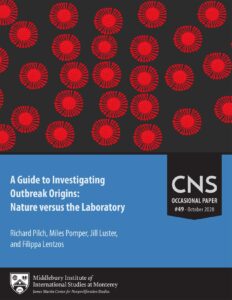October 28, 2020
Richard Pilch, Miles Pomper, Jill Luster, and Filippa Lentzos
 COVID-19 has exposed key gaps in the global community’s ability to assess infectious disease outbreaks of international concern, in particular the ability to differentiate between natural and laboratory sources of infection. The risk of natural outbreaks is increasing as unchecked population growth, industrial expansion, and corresponding ecological disruption increases the likelihood that novel disease agents will come into contact with naïve human populations. Likewise, the risk of laboratory accidents is increasing as more high-containment laboratories are built and higher risk experiments are conducted around the world. Meanwhile, a deliberate biological attack may resemble an outbreak of natural or accidental origin, and a natural or accidental outbreak may be misattributed as an attack.
COVID-19 has exposed key gaps in the global community’s ability to assess infectious disease outbreaks of international concern, in particular the ability to differentiate between natural and laboratory sources of infection. The risk of natural outbreaks is increasing as unchecked population growth, industrial expansion, and corresponding ecological disruption increases the likelihood that novel disease agents will come into contact with naïve human populations. Likewise, the risk of laboratory accidents is increasing as more high-containment laboratories are built and higher risk experiments are conducted around the world. Meanwhile, a deliberate biological attack may resemble an outbreak of natural or accidental origin, and a natural or accidental outbreak may be misattributed as an attack.
The purpose of this Occasional Paper is to outline a readily adoptable, stepwise methodology to guide the investigation of corresponding outbreak origins, building upon traditional epidemiological principles. We have sought to remain minimally intrusive at all times; however, an increasing level of need-to-know information, site, and personnel access becomes necessary as attention shifts toward potential laboratory sources. Accordingly, we include recommendations to ensure such access under existing international regimes, primarily the World Health Organization (WHO)’s International Health Regulations.
About the authors
Richard Pilch
Dr. Richard Pilch is the director of the Chemical and Biological Weapons Nonproliferation Program at the James Martin Center for Nonproliferation Studies (CNS) at the Middlebury Institute of International Studies at Monterey (MIIS). A physician by training, Dr. Pilch has focused on national security issues since 9/11 and the “anthrax letter” attacks of 2001. In 2002, he completed a postdoctoral fellowship in chemical and biological weapons nonproliferation at CNS, after which he spent nearly a decade overseas assessing and addressing biological warfare (BW), bioterrorism, and public-health emergencies of international concern, including threats posed by the former Soviet Union’s (FSU) legacy offensive BW program. He has performed onsite assessments of every known civilian BW facility in Russia, delivered thousands of man-hours of training to former Soviet scientists spanning nonproliferation, bioethics, and global health security, and planned and implemented dozens of cooperative research projects and pandemic response exercises across the FSU. Dr. Pilch has led multiple threat-reduction programs on behalf of the US government, served on over thirty technical panels and advisory boards, and authored more than sixty technical publications and White Papers. He co-edited the definitive Encyclopedia of Bioterrorism Defense (Wiley) with his longtime mentor, Dr. Raymond Zilinskas, in 2005.
Miles Pomper
Miles Pomper is a senior fellow in the Washington, DC, office of CNS. His work focuses on nuclear energy, nuclear nonproliferation, nuclear security, and nuclear-arms control. He holds a Master’s degree in international affairs from Columbia University and a Master’s degree in journalism from Northwestern University.
Before joining CNS, he served as editor-in-chief of Arms Control Today from 2003–09. Previously, he was the lead foreign policy reporter for CQ Weekly and Legi-Slate News Service, where he covered the full range of national security issues before Congress, and served as a Foreign Service Officer with the US Information Agency.
Jill Luster
As a senior research associate for CNS, Jill Luster supports multiple projects related to nonproliferation, machine learning, One Health security, and biological security and safety.
She previously led a team of researchers in support of the Department of State’s Office of Cooperative Threat Reduction. Prior to joining CNS in 2018, Jill Luster developed extensive experience supporting a wide range of US government and Department of Defense missions assessing WMD programs with a focus on Iran, dual-use commodity proliferation, and commercial sector vulnerabilities to illicit acquisition. She has worked across nonproliferation offices supporting WMD terrorism and defense engagement and threat-reduction activities. Ms. Luster mentored junior analysts and led an issue-oriented team as a senior analyst.
She holds a Master of Science in Biohazardous Threat Agents and Emerging Infectious Diseases from Georgetown University and a Bachelor of Arts in International Relations and German from The College of William and Mary.
Filippa Lentzos
Filippa Lentzos, PhD, is a senior research fellow at King’s College London, where she has a joint appointment in the Department of War Studies and the Department of Global Health & Social Medicine. She is also: an associate senior researcher with the armament and disarmament program at the Stockholm International Peace Research Institute (SIPRI); a biosecurity columnist at the Bulletin of the Atomic Scientists; an editor of the social science journal BioSocieties; and the nongovernmental organizations coordinator for the Biological and Toxin Weapons Convention. A biologist and social scientist by training, Dr. Lentzos has researched and been actively involved in biological disarmament and nonproliferation for over 15 years. Her 450-page edited volume Biological Threats in the 21st Century: The politics, people, science and historical roots was published by Imperial College Press in 2016. For more about her work, see www.filippalentzos.com and for regular updates follow her on Twitter: @FilippaLentzos.
